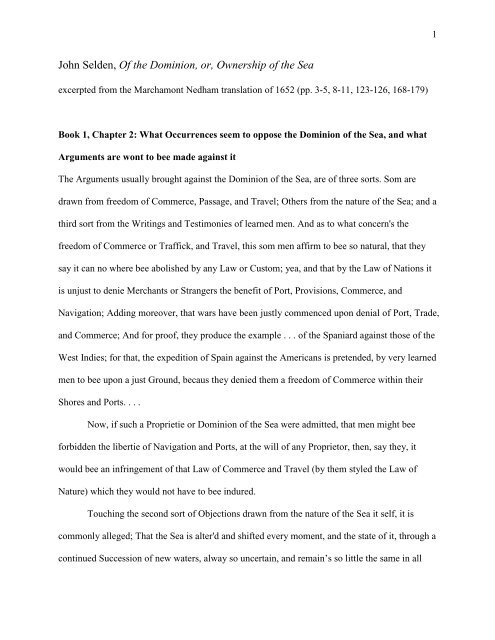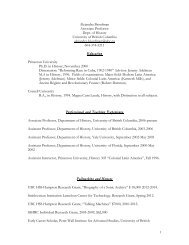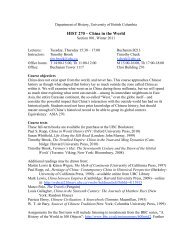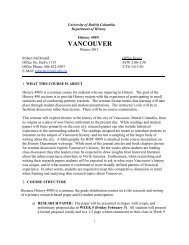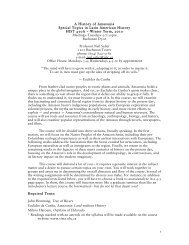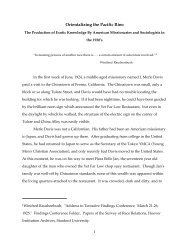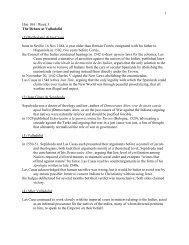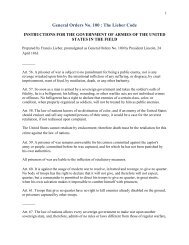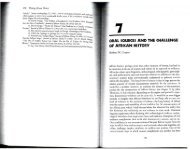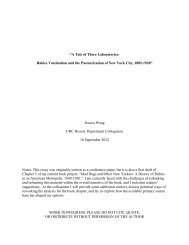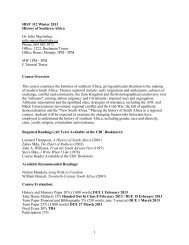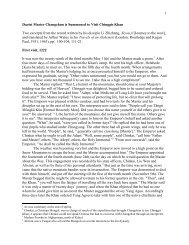Selden Closed Sea excerpts.pdf
Selden Closed Sea excerpts.pdf
Selden Closed Sea excerpts.pdf
You also want an ePaper? Increase the reach of your titles
YUMPU automatically turns print PDFs into web optimized ePapers that Google loves.
1<br />
John <strong>Selden</strong>, Of the Dominion, or, Ownership of the <strong>Sea</strong><br />
excerpted from the Marchamont Nedham translation of 1652 (pp. 3-5, 8-11, 123-126, 168-179)<br />
Book 1, Chapter 2: What Occurrences seem to oppose the Dominion of the <strong>Sea</strong>, and what<br />
Arguments are wont to bee made against it<br />
The Arguments usually brought against the Dominion of the <strong>Sea</strong>, are of three sorts. Som are<br />
drawn from freedom of Commerce, Passage, and Travel; Others from the nature of the <strong>Sea</strong>; and a<br />
third sort from the Writings and Testimonies of learned men. And as to what concern's the<br />
freedom of Commerce or Traffick, and Travel, this som men affirm to bee so natural, that they<br />
say it can no where bee abolished by any Law or Custom; yea, and that by the Law of Nations it<br />
is unjust to denie Merchants or Strangers the benefit of Port, Provisions, Commerce, and<br />
Navigation; Adding moreover, that wars have been justly commenced upon denial of Port, Trade,<br />
and Commerce; And for proof, they produce the example . . . of the Spaniard against those of the<br />
West Indies; for that, the expedition of Spain against the Americans is pretended, by very learned<br />
men to bee upon a just Ground, becaus they denied them a freedom of Commerce within their<br />
Shores and Ports. . . .<br />
Now, if such a Proprietie or Dominion of the <strong>Sea</strong> were admitted, that men might bee<br />
forbidden the libertie of Navigation and Ports, at the will of any Proprietor, then, say they, it<br />
would bee an infringement of that Law of Commerce and Travel (by them styled the Law of<br />
Nature) which they would not have to bee indured.<br />
Touching the second sort of Objections drawn from the nature of the <strong>Sea</strong> it self, it is<br />
commonly alleged; That the <strong>Sea</strong> is alter'd and shifted every moment, and the state of it, through a<br />
continued Succession of new waters, alway so uncertain, and remain’s so little the same in all
2<br />
things (the Channel onely excepted) that it is impossible it should ever bee retained in the<br />
possession of any one Particular. Moreover, they say the nature of Possession consist’s chiefly in<br />
a separation or distinction of Limits and Bounds, but no such Materials or Instuments can<br />
possibly bee found in the <strong>Sea</strong>, as that the Law for regulation of Bounds, which hath a principal<br />
place in all Controversies about Dominion or Ownership may bee grounded thereupon. . . . They<br />
are pleased likewise to insinuate, what a world of <strong>Sea</strong> room there is, that all Nations may have<br />
sufficient for watering, fishing, and Navigation: And therefore that the peculiar Dominion<br />
thereof is by no means to bee appropriated unto any. . . .<br />
But of our modern Lawyers, those that have appeared most forward in opposing a Right<br />
of Dominion over the <strong>Sea</strong>, are onely two, both very eminent men, but of unequal learning and<br />
elegancie of wit; by the name Fernandus Vasquius [Fernando Vázquez de Menchaca, 1512-69]<br />
the Spaniard, and Hugo Grotius [Huig de Groot, 1583-1645] the Hollander: the former an<br />
honorable Counsellor to King Philip the 3. of Spain in his high Court of Exchequer. The later<br />
was heretofore Advocate Fiscal of Holland, Zeland, and West-Friesland, and most deservedly<br />
adorned with divers other honors in his own Countrie; a man of an acute judgment, and for his<br />
excellencie in all kinds of learning incomparable. . . .<br />
But in the year MDCIX (it beeing the year after that large Treatie held at the Hage<br />
[Hague] betwixt the Spaniard and the Hollander, about freedom of Trade and Navigation to the<br />
East-Indies) there was published that Book of Hugo Grotius, entituled MARE LIBERUM, or a<br />
discours concerning that Right which the Hollanders have to Trade in the Indies. Wherein hee<br />
endeavor’s first to prove, that, by the Law of Nations, there ought to bee such a freedom of<br />
Navigation for all men whatsoëver, which waie they pleas, so that they cannot, without injurie,<br />
bee molested at <strong>Sea</strong>. Next, that the Atlantick and Southern Ocean, or the Right of Navigation to
3<br />
the Indies, is not, nor indeed can bee, any peculiar of the Portugalls: forasmuch as the <strong>Sea</strong> (saith<br />
hee, according to the Laws and reasons already mentioned) can be in no wise becom the<br />
Proprietie of any one; becaus nature not onely permit’s, but require’s it should bee common.<br />
Several other passages hee hath about this matter, in his excellent Book De Jure Belli & pacis; of<br />
which more hereafter. Thus much in brief, concerning those arguments that are usually brought<br />
against the Dominion or Ownership of the <strong>Sea</strong>. . . .<br />
Chapter 20: An Answer to the Objection, concerning Freedom of Passage to Merchants,<br />
Strangers, and <strong>Sea</strong>-men.<br />
The usual Objections (as hath been more fully shewn before in the second Chapter) are derived,<br />
som from the Freedom of Commerce, Travel, and Passage, pretended to bee common to all: Som<br />
also from the very Nature of the <strong>Sea</strong>: And others out of the Testimonies of Writers. As to what<br />
concern’s the first sort; the Offices of humanitie require, that entertainment bee given to<br />
Strangers, and that inoffensive passage bee not denied them. . . . But what is this to the Dominion<br />
of that thing, through which both Merchants and Strangers are to pass? Such a freedom of<br />
Passage would no more derogate from it, (if so bee it were without question free and open to all<br />
upon that accompt) then the allowing of an open waie for the driving of Cattel, or Cart, or<br />
passing through upon a journie, or any other Service of that nature, through another man’s Field,<br />
could prejudice the Ownership thereof. Suppose it bee granted, that, by the Law of all Nations,<br />
the Spaniards had a free Passage over the Pyrenean Mountains into France; the French over the<br />
Alps into Italie; the Italians into Germanie: What doth this concern a Dominion of the Pyrenies<br />
or the Alps? And for any man to allege here, what is commonly talked, of the lighting of one<br />
Candle by another, of the not denying a common use of Water, and other things of that nature, it
4<br />
is plainly to give over the disquisition of Law and Right, to insist upon that of Charitie. . . . So<br />
that it in no wise diminisheth from any man’s Right or Power, to permit another to participate of<br />
what is his, when hee himself loseth nothing thereof. And that wee may determine this point in<br />
brief, it is most evident from the Customs of all times, that free Passage (as they call it) is wont<br />
ever to bee so limited by Princes in their Territories, that it is permitted or prohibited, according<br />
to the various concernments of the Publick Good, and not otherwise. . . . But that Wars have<br />
been lawfully undertaken for a denial of Commerce, unless the denial were given contrary to<br />
som antient League, or unless that freedom depended upon som special Tide to Commerce, wee<br />
do as easily deny as any other man can affirm. And though, according to the opinion of<br />
Franciscus Victoria [Francisco de Vitoria, c.1483-1546], who also is followed chiefly by Joannes<br />
Solorzanus [author of De Indiarum jure] it bee affirmed, that the Spaniard had a lawful Right to<br />
subdue the Indians, because they denied Commerce and Entertainment; yet they are in plain<br />
tearms opposed by Ludovicus Molina [1535-1600], who will have no Nation or Common weal<br />
bound, either with or without danger to it self, to admit Commerce or Foreigners, but in case of<br />
great and imminent necessitie, or unless any League, Agreement, or som other special privilege<br />
do intervene. But there are other pretences not a few which the Spaniards allege for the Conquest<br />
of the Indies: For, they pretend also a Right of Discoverie, primarie occupation, Conversion to<br />
the Faith, and other things of that nature, besides the Donation of the Pope. Of all which,<br />
Solorzanus treat’s at large. And it is strange, how the Spaniards should have a Right to acquire<br />
the Indies, upon a denial of Commerce, since it is very well known, that both They and the<br />
Portugals do openly profess, that they may lawfully prohibit Commerce in both the Indies. Nor<br />
doth it prejudice the point at all, that according to the Imperial Law, no Prince, nor any other<br />
holding Royalties by his Grant, can forbid men passage in the common Road without som just
5<br />
caus, which must bee determined in an Imperial Diet; nevertheless, it is wrested by som to prove<br />
a freedom of Navigation at <strong>Sea</strong>. For that happen’d by a particular Law, agree'd upon by the<br />
Estates of the Empire, who themselvs also are subject to a Diet. But other Nations that are under<br />
several and distinct Soveraignties, have not yet made any such Agreement, that there should<br />
alwaies bee a libertie of Passage to and fro; nor have they (like the Germanes, and others within<br />
their Dominion) referr’d themselvs unto an Umpire to determine the business.<br />
Chapter 26: An Answer to the Opinions of modern Lawyers, so far as they oppose a<br />
Dominion of the <strong>Sea</strong>; especially of Fernandus Vasquius, and Huge Grotius.<br />
Having thus refuted, or upon good ground removed som Opinons of antient Lawyers, which are<br />
usually alleged for the mainteining of a perpetual Communitie of the <strong>Sea</strong>; it is no hard matter in<br />
like manner to wave the Autoritie of those of later time, that oppose a Dominion. . . . Unless wee<br />
conceiv that som of them did not so much explain the Law in this point, as recite the opinions of<br />
Lawyers, so far as they have been by them deliver'd: Just in the same manner, as if a man should<br />
so discours upon Aristotle’s Astronomie, or the opinion of Thales touching the Earth’s floating,<br />
like a Dish in the <strong>Sea</strong>, and that of the Stoicks of its encompassing the Earth like a Girdle, with<br />
that of the Antients concerning an extreme heat under the Equinoctial, and other opinions of that<br />
kinde, which are rejected and condemned, by the observation and experience of Posteritie; that<br />
hee might seem not so much to search into the thing it self, as to represent the person of the<br />
Autor, thereby to trace out his meaning, onely for the discovering of his opinion. But as the root<br />
beeing cut, the Tree fall’s, so the Autoritie of those antient Lawyers beeing removed out of the<br />
Way, all the determinations of the modern which are supported by it, must bee extremely<br />
weakned.
6<br />
Now therefore, as to what hath been formerly alleged out of Fernandus Vasquius, it is<br />
grounded upon such Arguments as are either manifestly fals, or impertinent. For, what is this to<br />
the purpose? That the <strong>Sea</strong>, from the beginning of the world to this present day, is, and ever hath<br />
been in common, without the least alteration, as ‘tis generally known. Whereas the quite<br />
contrarie is most certainly known to those, who have had any insight into the received Laws and<br />
Customs of Ages and Nations. That is to say, that by most approved Law and Custom, som <strong>Sea</strong>s<br />
have passed into the Dominion and patrimonie, both of Princes and private persons; as is clearly<br />
made manifest out of what hath been alreadie shewn you. Moreover also hee would have<br />
prescription to ceas betwixt Foreigners in relation to each other, and not to take place in the Law<br />
of Nations, but in the Civil onely; so that by his Opinion prescription should bee of no force<br />
between those (as between two supreme states or Princes) who are not indifferently subject to the<br />
Civil Law, which admit’s prescription; then which not any thing can bee said or imagined more<br />
absurd. Almost all the principal points of the Intervenient Law of Nations, beeing established by<br />
long consent of persons using them, do depend upon prescription or antient Custom. To say<br />
nothing of those Princes, whose Territories were subject heretofore to the Roman Empire, and<br />
who afterwards became absolute within themselvs, not onely by Arms, but also by prescription<br />
(which is every where admitted among the Laws of Nations;) . . . As for those other things<br />
mentioned by Vasquius, concerning Charitie and the inexhaustible abundance of the <strong>Sea</strong><br />
(whereby hee makes a difference betwixt Rivers and <strong>Sea</strong>s) and other things of the like nature,<br />
they have no relation at all to the point of Dominion; as you have been sufficiently told alreadie.<br />
In the next place, wee com to the other, to wit, Hugo Grotius, a man of great learning,<br />
and extraordinarie knowledg in things both Divine and Humane; whose name is very frequent in<br />
the mouths of men every where, to maintein a natural and perpetual Communitie of the <strong>Sea</strong>. Hee
7<br />
hath handled that point in two Books; in his Mare Liberum, and in that excellent work De Jure<br />
Belli & pacis. As to what concern’s Mare Liberum, a Book that was written against the Portugals<br />
about trading into the Indies through the vast Atlantick and Southern Ocean; it contein’s indeed<br />
such things as have been delivered by antient Lawyers touching communitie of the <strong>Sea</strong>; Yea, and<br />
disputing for the Profits and Interests of his Countrie, hee draw’s them into his own partie; and<br />
so endeavor's to prove that the <strong>Sea</strong> is not capable of private Dominion. But hee hath so warily<br />
couched this subject with other things, that whether in this hee did hit or miss, the rest howsoëver<br />
might serv to assert the point which hee was to handle. Moreover, hee discourseth about the Title<br />
of Discoverie, and primarie occupation (pretended to by the Portugals) and that also which is by<br />
Donation from the Pope. And hee seem’s in a manner, either somtimes to quit that natural and<br />
perpetual Communitie, which many Civil Lawyers are eager to maintein, and hee himself, in<br />
order to his design, endeavored to confirm, or els to confess that it can hardly bee defended. For,<br />
concerning those <strong>Sea</strong>s that were inclosed by the antient Romans, the nature of the <strong>Sea</strong>, saith hee,<br />
differs from the Shore in this, that the <strong>Sea</strong>, unless it bee in som small part of it self, is not easily<br />
capable of Building or Inclosure. And put case it were, yet even this could hardly bee without the<br />
hindrance of common use. Nevertheless, if any small part of it may bee thus possessed, it falls to<br />
him that enters upon it first by occupation. Now, the difference of a lesser and a greater part,<br />
cannot take place (I suppose) in the determining of private Dominion. But in express words hee<br />
except’s even a Bay or Creek of the <strong>Sea</strong>. And a little after, saith hee, Wee do not speak here of an<br />
In-land <strong>Sea</strong>, which in som places being streightened with Land on every side, exceeds not the<br />
breadth even of a River, yet 'tis clear that this was what the Roman Lawyers spake of, when they<br />
set forth those notable determinations against private Avarice. But the Question is concerning<br />
the Ocean, which Antiquitie called immense Infinit, the Parent or Original of things, consisting
8<br />
with the Air. And afterwards hee saith, The Controversie is not about a Streight or Creek in this<br />
Ocean, nor so much as is within view when one stand’s upon the shore. A little farther also,<br />
speaking of Prescription, hee saith, It is to bee added, that their Autoritie are of the contrarie<br />
opinion, cannot bee applied to this Question. For, they speak of the Mediterranean <strong>Sea</strong>, wee of<br />
the Ocean. They of a Creek or Bay, wee of the broad and wide <strong>Sea</strong>, which differ very much in the<br />
point of Occupation. And certainly, there is no man but must conceiv it a very difficult thing to<br />
possess the whole Ocean: Though if it could bee held by occupation, like a narrow <strong>Sea</strong>, or a<br />
Creek, or as the whole world was said to bee possessed at first by antient Princes, it might even<br />
as well pass into the Dominion or Ownership of him that should enter upon it first by occupation.<br />
However, there have been som others, who by the same Rule distinguish in like manner the inner<br />
and neighboring <strong>Sea</strong>s from the open <strong>Sea</strong> or main Ocean.<br />
But it is by no means to bee omitted, that they, for whose sakes Hugo Grotius wrote that<br />
Book, that is to say, the States of Holland, did, not unwillingly, but rather (as it seem’s)<br />
according to their own hearts desire, give ear to the condemnation of that Opinion (especially<br />
because it was owned by Grotius) concerning a Communitie of the <strong>Sea</strong> and freedom of Fishing<br />
therein according to the Law natural and of Nations by the Embassador of James King of great<br />
Britain, in a speech of his deliver’d openly in Holland; and that others were gravely admonished<br />
from his misfortune, not to maintein the like. Of which thing Grotius himself bear’s witness. I<br />
have labored, saith hee, as much as any to maintein the Right of Navigation to the Indies, and for<br />
the preservation of Clothdressing in our Countrie. But for the freedom of Fishing at <strong>Sea</strong> so much,<br />
that Carleton the King of great Britain’s Embassador, beeing incited by my enemies to speak<br />
somwhat in publick against mee beeing at that time in Prison, hee hath nothing els to say, but<br />
that I had begun to make som Discourses in defence of that freedom, as a thing grounded upon
9<br />
the Law of Nations, and Customs, time out of minde; whereas notwithstanding, nothing had been<br />
said or written by mee upon that subject, different from those things which the State’s<br />
Embassadors had mainteined in Britain in the year MDCX; and our Ancestors before, even for<br />
som Ages past. And yet that Embassador said, that others ought to bee terrified by the example<br />
of my misfortune, from defending that Opinion. It is true indeed, that persons in power usually<br />
take a libertie to aspers men as they pleas when they are in question: But these things were not<br />
spoken so much against Hugo Grotius, as against that natural Right of Communitie at <strong>Sea</strong><br />
(injuriously pretended to) which many men have defended more expressly and plainly then<br />
himself; but none, with so much learning and ingenuitie. Nor, did that Speech of the Embassador,<br />
for ought wee know, as things then stood, displeas the States of Holland.<br />
But in his Books de Jure Belli & Pacis, having indeed set down the reason of the<br />
original of private Dominion to bee upon this ground, that those places which became peculiarly<br />
assigned were not sufficient for the maintenance of all men, hee conclude’s that the <strong>Sea</strong>, becaus<br />
of its bigness and inexhaustible abundance, beeing sufficient for all, cannot bee appropriated to<br />
any. Hee add’s other things also, touching the nature of the <strong>Sea</strong>s not beeing distinguishable by<br />
Bounds, of both which wee have said enough alreadie. But at length hee betake’s himself to the<br />
received Customs of Nations and speak’s more then once concerning the proprietie or private<br />
Dominion of the <strong>Sea</strong>, as of a thing sometimes to bee yielded without Controversie. The Land,<br />
saith hee, and Rivers, and any part of the <strong>Sea</strong>, in case it com under the proprietie of som Nation,<br />
ought to bee open for such as have need of passage upon just and necessarie occasions.<br />
Afterwards also, speaking of the proprietie of Rivers, After this example, saith hee, it seems that<br />
even the <strong>Sea</strong> may bee possessed by him that is Owner of the Land on both sides, although it lie<br />
open either above, as a Creek; or above and below too, as a streight or narrow <strong>Sea</strong>: So that it
10<br />
bee not so great a part of the <strong>Sea</strong>, that beeing compared with the Lands it cannot seem to bee<br />
any portion of them. And that which is lawful for one Prince or People, the same seem’s lawful<br />
also for two or three, if in the like manner they pleas to enter upon the <strong>Sea</strong> flowing between. For<br />
so, rivers that flow between two Nations, have been entred upon by both, and then divided. Hee<br />
allegeth other things also touching the Right of primarie occupation by <strong>Sea</strong>; but so, that for the<br />
most part hee contein’s him self within Creeks and Streights. Hee saith, that not by any natural<br />
Right or Reason, but by Custom it came to pass, that the <strong>Sea</strong> was not appropriated, or that it<br />
could not lawfully bee entred upon by Right of Occupation. And that the Custom beeing changed,<br />
is there were any in the antient Law that might hinder a private Dominion of the <strong>Sea</strong>, the reason<br />
of Communitie must bee changed also. But that it hath been sufficiently changed, appears<br />
abundantly (if I bee not deceived) out of what wee have hitherto shewn you. Yea, the very Laws<br />
as well Civil as Intervenient of most Nations make abundantly to this purpose, as it hath been<br />
proved.<br />
. . . But upon due consideration of all those particulars, which hitherto have been<br />
produced out of the Customs of so many Ages and Nations, and as well out of the Civil, as the<br />
Common or Intervenient Law of most Nations, no man ( I suppose) will question but that there<br />
remain's not either in the nature of the <strong>Sea</strong> it self, or in the Law either Divine, Natural, or of<br />
Nations, any thing which may so oppose the private Dominion thereof, that it cannot bee<br />
admitted by every kinde of Law, even the most approved; and so that any kinde of <strong>Sea</strong><br />
whatsoever may by any sort of Law whatsoever bee capable of private Dominion; which was the<br />
thing I intended to prove.<br />
The End of the first Book.


